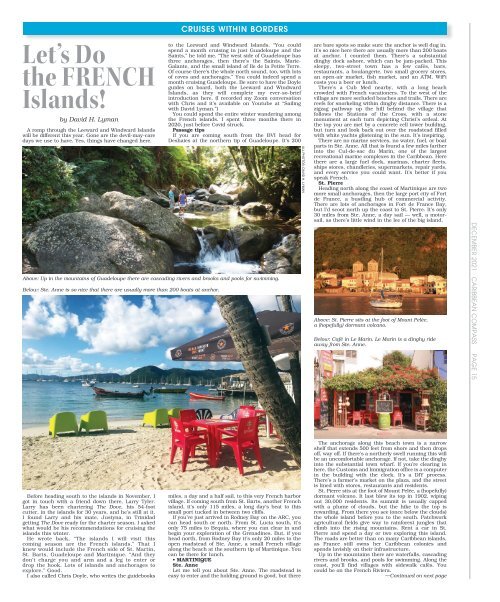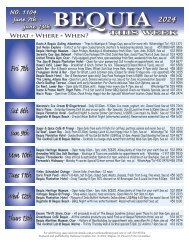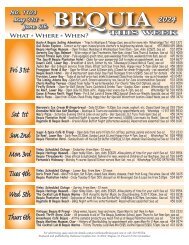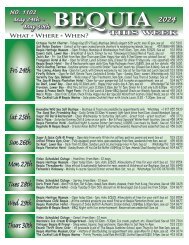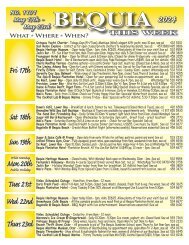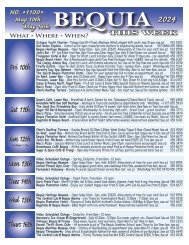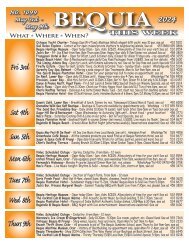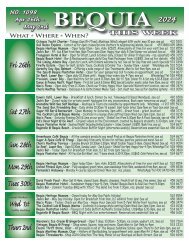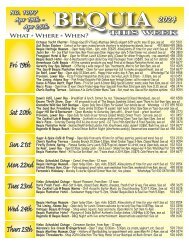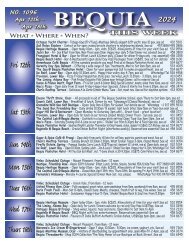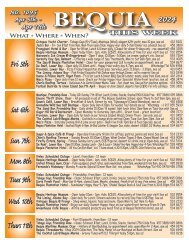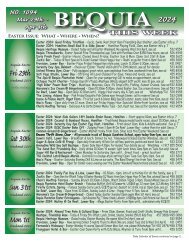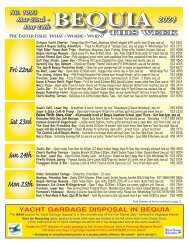Caribbean Compass Yachting Magazine - December 2021
Welcome to Caribbean Compass, the most widely-read boating publication in the Caribbean! THE MOST NEWS YOU CAN USE - feature articles on cruising destinations, regattas, environment, events...
Welcome to Caribbean Compass, the most widely-read boating publication in the Caribbean! THE MOST NEWS YOU CAN USE - feature articles on cruising destinations, regattas, environment, events...
You also want an ePaper? Increase the reach of your titles
YUMPU automatically turns print PDFs into web optimized ePapers that Google loves.
CRUISES WITHIN BORDERS<br />
Let’s Do<br />
the FRENCH<br />
Islands!<br />
by David H. Lyman<br />
A romp through the Leeward and Windward Islands<br />
will be different this year. Gone are the devil-may-care<br />
days we use to have. Yes, things have changed here.<br />
to the Leeward and Windward Islands. “You could<br />
spend a month cruising in just Guadeloupe and the<br />
Saints,” he told me. “The west side of Guadeloupe has<br />
three anchorages, then there’s the Saints, Marie-<br />
Galante, and the small island of Ile de la Petite Terre.<br />
Of course there’s the whole north sound, too, with lots<br />
of coves and anchorages.” You could indeed spend a<br />
month cruising Guadeloupe. Be sure to have the Doyle<br />
guides on board, both the Leeward and Windward<br />
Islands, as they will complete my ever-so-brief<br />
introduction here. (I recorded my Zoom conversation<br />
with Chris and it’s available on Youtube at “Sailing<br />
with David Lyman.”)<br />
You could spend the entire winter wandering among<br />
the French islands. I spent three months there in<br />
2020, just before Covid struck.<br />
Passage tips<br />
If you are coming south from the BVI head for<br />
Deshaies at the northern tip of Guadeloupe. It’s 200<br />
Above: Up in the mountains of Guadeloupe there are cascading rivers and brooks and pools for swimming.<br />
Below: Ste. Anne is so nice that there are usually more than 200 boats at anchor.<br />
ALL PHOTOS: DAVID H. LYMAN<br />
are bare spots so make sure the anchor is well dug in.<br />
It’s so nice here there are usually more than 200 boats<br />
at anchor. I counted them. There’s a substantial<br />
dinghy dock ashore, which can be jam-packed. This<br />
sleepy, two-street town has a few cafés, bars,<br />
restaurants, a boulangerie, two small grocery stores,<br />
an open-air market, fish market, and an ATM. WiFi<br />
costs you a beer or lunch.<br />
There’s a Cub Med nearby, with a long beach<br />
crowded with French vacationers. To the west of the<br />
village are more secluded beaches and trails. There are<br />
reefs for snorkeling within dinghy distance. There is a<br />
zigzag pathway up the hill behind the village that<br />
follows the Stations of the Cross, with a stone<br />
monument at each turn depicting Christ’s ordeal. At<br />
the top you are met by a concrete cell tower building,<br />
but turn and look back out over the roadstead filled<br />
with white yachts glistening in the sun. It’s inspiring.<br />
There are no marine services, no water, fuel, or boat<br />
parts in Ste. Anne. All that is found a few miles farther<br />
into the Cul-de-sac du Marin, one of the largest<br />
recreational marine complexes in the <strong>Caribbean</strong>. Here<br />
there are a large fuel dock, marinas, charter fleets,<br />
ships stores, chandleries, supermarkets, repair yards,<br />
and every service you could want. It’s better if you<br />
speak French.<br />
St. Pierre<br />
Heading north along the coast of Martinique are two<br />
more small anchorages, then the large port city of Fort<br />
de France, a bustling hub of commercial activity.<br />
There are lots of anchorages in Fort de France Bay,<br />
but I’d scoot north up the coast to St. Pierre. It’s only<br />
30 miles from Ste. Anne, a day sail — well, a motorsail,<br />
as there’s little wind in the lee of the big island.<br />
Above: St. Pierre sits at the foot of Mount Pelée,<br />
a (hopefully) dormant volcano.<br />
Below: Café in Le Marin. Le Marin is a dinghy ride<br />
away from Ste. Anne.<br />
DECEMBER <strong>2021</strong> CARIBBEAN COMPASS PAGE 15<br />
Before heading south to the islands in November, I<br />
got in touch with a friend down there, Larry Tyler.<br />
Larry has been chartering The Dove, his 54-foot<br />
cutter, in the islands for 30 years, and he’s still at it.<br />
I found Larry and his mate, Justyna, in Trinidad<br />
getting The Dove ready for the charter season. I asked<br />
what would be his recommendations for cruising the<br />
islands this winter.<br />
He wrote back, “The islands I will visit this<br />
coming season are the French islands.” That I<br />
knew would include the French side of St. Martin,<br />
St. Barts, Guadeloupe and Martinique. “And they<br />
don’t charge you and arm and a leg to enter or<br />
drop the hook. Lots of islands and anchorages to<br />
explore.” Good.<br />
I also called Chris Doyle, who writes the guidebooks<br />
miles, a day and a half sail, to this very French harbor<br />
village. If coming south from St. Barts, another French<br />
island, it’s only 115 miles, a long day’s beat to this<br />
small port tucked in between two cliffs.<br />
If you’ve just arrived in Rodney Bay on the ARC, you<br />
can head south or north. From St. Lucia south, it’s<br />
only 75 miles to Bequia, where you can clear in and<br />
begin your exploration of the Grenadines. But, if you<br />
head north, from Rodney Bay it’s only 20 miles to the<br />
open roadstead of Ste. Anne, a small French village<br />
along the beach at the southern tip of Martinique. You<br />
can be there for lunch.<br />
• MARTINIQUE<br />
Ste. Anne<br />
Let me tell you about Ste. Anne. The roadstead is<br />
easy to enter and the holding ground is good, but there<br />
The anchorage along this beach town is a narrow<br />
shelf that extends 500 feet from shore and then drops<br />
off, way off. If there’s a northerly swell running this will<br />
be an uncomfortable anchorage. If not, take the dinghy<br />
into the substantial town wharf. If you’re clearing in<br />
here, the Customs and Immigration office is a computer<br />
in the building with the clock. It’s a DIY process.<br />
There’s a farmer’s market on the plaza, and the street<br />
is lined with stores, restaurants and residents.<br />
St. Pierre sits at the foot of Mount Pelée, a (hopefully)<br />
dormant volcano. It last blew its top in 1902, wiping<br />
out 30,000 residents. Its summit is usually capped<br />
with a plume of clouds, but the hike to the top is<br />
rewarding. From there you see (once below the clouds)<br />
the whole island before you to the south. Patchwork<br />
agricultural fields give way to rainforest jungles that<br />
climb into the rising mountains. Rent a car in St.<br />
Pierre and spend a day or two exploring this island.<br />
The roads are better than on many <strong>Caribbean</strong> islands,<br />
as France still owns her <strong>Caribbean</strong> colonies and<br />
spends lavishly on their infrastructure.<br />
Up in the mountains there are waterfalls, cascading<br />
rivers and brooks, and pools for swimming. Along the<br />
coast, you’ll find villages with sidewalk cafés. You<br />
could be on the French Riviera.<br />
—Continued on next page


